
Color, 1979, 134m.
Directed by Mark Rydell
Starring Bette Midler, Alan Bates, Frederic Forrest, Harry Dean Stanton, Barry Primus, David Keith, Sandra McCabe
Criterion (Blu-ray & DVD) (US RA/R1 HD/NTSC), Fox (DVD worldwide) / WS (1.85:1) (16:9)

Color, 1979, 134m.
Directed by Mark Rydell
Starring Bette Midler, Alan Bates, Frederic Forrest, Harry Dean Stanton, Barry Primus, David Keith, Sandra McCabe
Criterion (Blu-ray & DVD) (US RA/R1 HD/NTSC), Fox (DVD worldwide) / WS (1.85:1) (16:9)
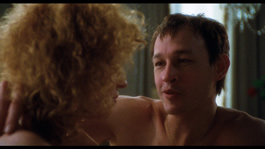 Originally intended as a Janis Joplin biopic but morphed into a fictionalized look at self-destructive rock stardom, The Rose is set ten years before its 1979
Originally intended as a Janis Joplin biopic but morphed into a fictionalized look at self-destructive rock stardom, The Rose is set ten years before its 1979 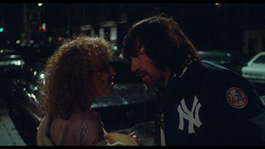 release and opened in theaters the same year as another drastically modified look at 1960s, Hair. However, it soon came to grow in significance more as part of the final wave of artistic New Hollywood productions pouring out at the end of the decade and, with All That Jazz, was one of two Fox musical dramas in '79 that seemed to have heavy doses of booze and coke flowing through their narrative veins. The film quickly made an instant star out of Bette Midler (in her first studio film), who had risen from bathhouse performances to successful live shows and albums, and turned the title song into a standard that remains popular today.
release and opened in theaters the same year as another drastically modified look at 1960s, Hair. However, it soon came to grow in significance more as part of the final wave of artistic New Hollywood productions pouring out at the end of the decade and, with All That Jazz, was one of two Fox musical dramas in '79 that seemed to have heavy doses of booze and coke flowing through their narrative veins. The film quickly made an instant star out of Bette Midler (in her first studio film), who had risen from bathhouse performances to successful live shows and albums, and turned the title song into a standard that remains popular today.
Upon returning to her hometown to play a concert, Mary Rose Foster (Midler), better known as "the Rose," is driven to mental and physical extremes by her manager, Rudge (Bates, never seedier), who refuses to grant her time off even when she publicly announces it in front of a crowd. A late night out at a diner with limo driver Huston (Forrest) turns into a foul-mouthed fist fight, a raucous night at a drag bar, and later a romance that she hopes will pull her out of the devastating spiral of life on the road.
Surrounded by men for almost all of her screen time, this is Midler's show all the way as she seizes the role with gusto from the opening dynamic concert sequence (much of it captured in long single takes). The film was an interesting change of pace for director Mark Rydell, who had made his feature debut with the taboo-pushing drama The Fox and gone on to The Cowboys, The Reivers, and 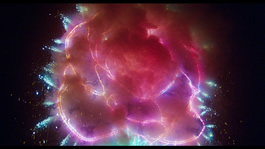 Harry and Walter Go to New York, none of which could have anticipated the large-scale rock show atmosphere conjured up here. There's nothing particularly revolutionary in the plotline itself (your standard downbeat tract about how superstardom is lonely and can kill you), but as a one-woman showcase, it's a tough one to beat and still a
Harry and Walter Go to New York, none of which could have anticipated the large-scale rock show atmosphere conjured up here. There's nothing particularly revolutionary in the plotline itself (your standard downbeat tract about how superstardom is lonely and can kill you), but as a one-woman showcase, it's a tough one to beat and still a 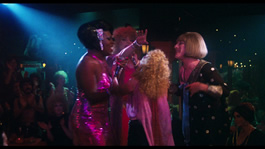 unique film that would never be mounted today, as much as rumors of real Joplin biopics keep getting floated around every couple of years. Interestingly, this was originally offered to Ken Russell, who decided to go off and make Valentino instead; the mind boggles at what the final results might have been.
unique film that would never be mounted today, as much as rumors of real Joplin biopics keep getting floated around every couple of years. Interestingly, this was originally offered to Ken Russell, who decided to go off and make Valentino instead; the mind boggles at what the final results might have been.
The Rose was shot by Vilmos Zsigmond just after Close Encounters of the Third Kind and The Deer Hunter, and his affinity for using darkness and impressionistic, moody lighting in lieu of crisp cinematography is well in evidence here. DVDs have always struggled fruitlessly with the intentionally raw, dark, and sometimes grainy texture of the film, but the 2015 Blu-ray release from Criterion (with a Zsigmond-approved 4K-based transfer) does a far better job of capturing that rich, deep look of the film's theatrical appearance. The appearance is about as pristine as this film could possibly be, and the concert scenes pop now with a vivid saturation SD couldn't hope to capture. Fans should be more than pleased with the results here. The 5.1 DTS-HD track is also a fine representation of the film's theatrical mix, which was two-channel Dolby Stereo is regular theaters with a six-track mix for 70mm blow-up engagements (the basis for what's heard here). Rear channels are mainly used for crowd effects and some music support, which is as it should be.
The first extra here is an audio commentary with Rydell, 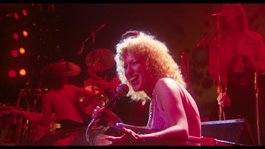 who covers the production experience from the original Joplin-centric source material through the casting of Midler and how she was able to win over crowds for the live concert scenes even for people who had no idea who she was. There are some very long gaps of silence here but his comments are interesting, such as his account of how Harry Dean Stanton's big scene left Midler emotionally shattered. Rydell also covers the other famous cinematographers brought in to do cameraman duties on some of the nine cameras for the concert scenes including Owen Roizman, László Kovács, Conrad Hall, and Haskell Wexler. A new 17-minute interview with Midler (who looks fantastic) is a candid account of her initial dislike for the script she was offered, her own experiences on the road as a female entertainer, her love of Joplin and the hardness of R&B, and the challenges of doing all of the singing scenes live in front of huge crowds. Rydell comes next with a 16-minute interview with Charles Dennis containing more background about how he originally came to the project (both he and Midler take responsibility for veering the film away from a biopic, curiously enough), including his insistence of using live singing and keeping the language raw as a reflection of the time period. Zsigmond has the most in-depth featurette, a 30-minute chat with John Bailey about the demands of the project and how he brought in his notable colleagues to work on the project, not to mention a third account of why Joplin's name wasn't used in the film. It's always great to hear from one of the all-time great cinematographers explaining his craft, and it's a good crash course in how the unique look of the film was achieved. A 1978 clip from the NBC morning show Today features Tom Brokaw providing voiceover for production footage of Midler and Rydell shooting a scene early in the morning on the streets of New York, clocking in just under five minutes including brief interviews with the pair. Finally a 1979 14-minute interview with Midler by Gene Shalit (originally shown in two parts) covers her love for R&B and rock, the state of her career up to that point, and her thoughts on the soundtrack. The theatrical trailer is not included but can readily be found on the previous Fox DVDs, which also included the Rydell commentary.The packaging features an extensive essay by Paula Mejia, "High Tragedy on Tour," exploring how Midler's beginnings had an impact on her decision to do this film and the decisions she brought to her big break.
who covers the production experience from the original Joplin-centric source material through the casting of Midler and how she was able to win over crowds for the live concert scenes even for people who had no idea who she was. There are some very long gaps of silence here but his comments are interesting, such as his account of how Harry Dean Stanton's big scene left Midler emotionally shattered. Rydell also covers the other famous cinematographers brought in to do cameraman duties on some of the nine cameras for the concert scenes including Owen Roizman, László Kovács, Conrad Hall, and Haskell Wexler. A new 17-minute interview with Midler (who looks fantastic) is a candid account of her initial dislike for the script she was offered, her own experiences on the road as a female entertainer, her love of Joplin and the hardness of R&B, and the challenges of doing all of the singing scenes live in front of huge crowds. Rydell comes next with a 16-minute interview with Charles Dennis containing more background about how he originally came to the project (both he and Midler take responsibility for veering the film away from a biopic, curiously enough), including his insistence of using live singing and keeping the language raw as a reflection of the time period. Zsigmond has the most in-depth featurette, a 30-minute chat with John Bailey about the demands of the project and how he brought in his notable colleagues to work on the project, not to mention a third account of why Joplin's name wasn't used in the film. It's always great to hear from one of the all-time great cinematographers explaining his craft, and it's a good crash course in how the unique look of the film was achieved. A 1978 clip from the NBC morning show Today features Tom Brokaw providing voiceover for production footage of Midler and Rydell shooting a scene early in the morning on the streets of New York, clocking in just under five minutes including brief interviews with the pair. Finally a 1979 14-minute interview with Midler by Gene Shalit (originally shown in two parts) covers her love for R&B and rock, the state of her career up to that point, and her thoughts on the soundtrack. The theatrical trailer is not included but can readily be found on the previous Fox DVDs, which also included the Rydell commentary.The packaging features an extensive essay by Paula Mejia, "High Tragedy on Tour," exploring how Midler's beginnings had an impact on her decision to do this film and the decisions she brought to her big break.
![]()